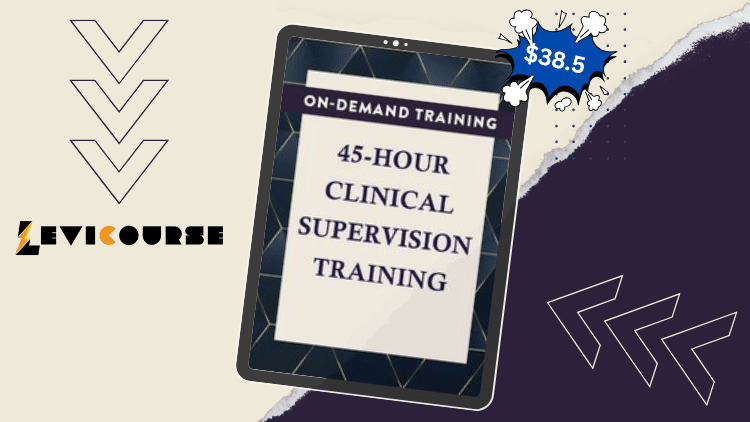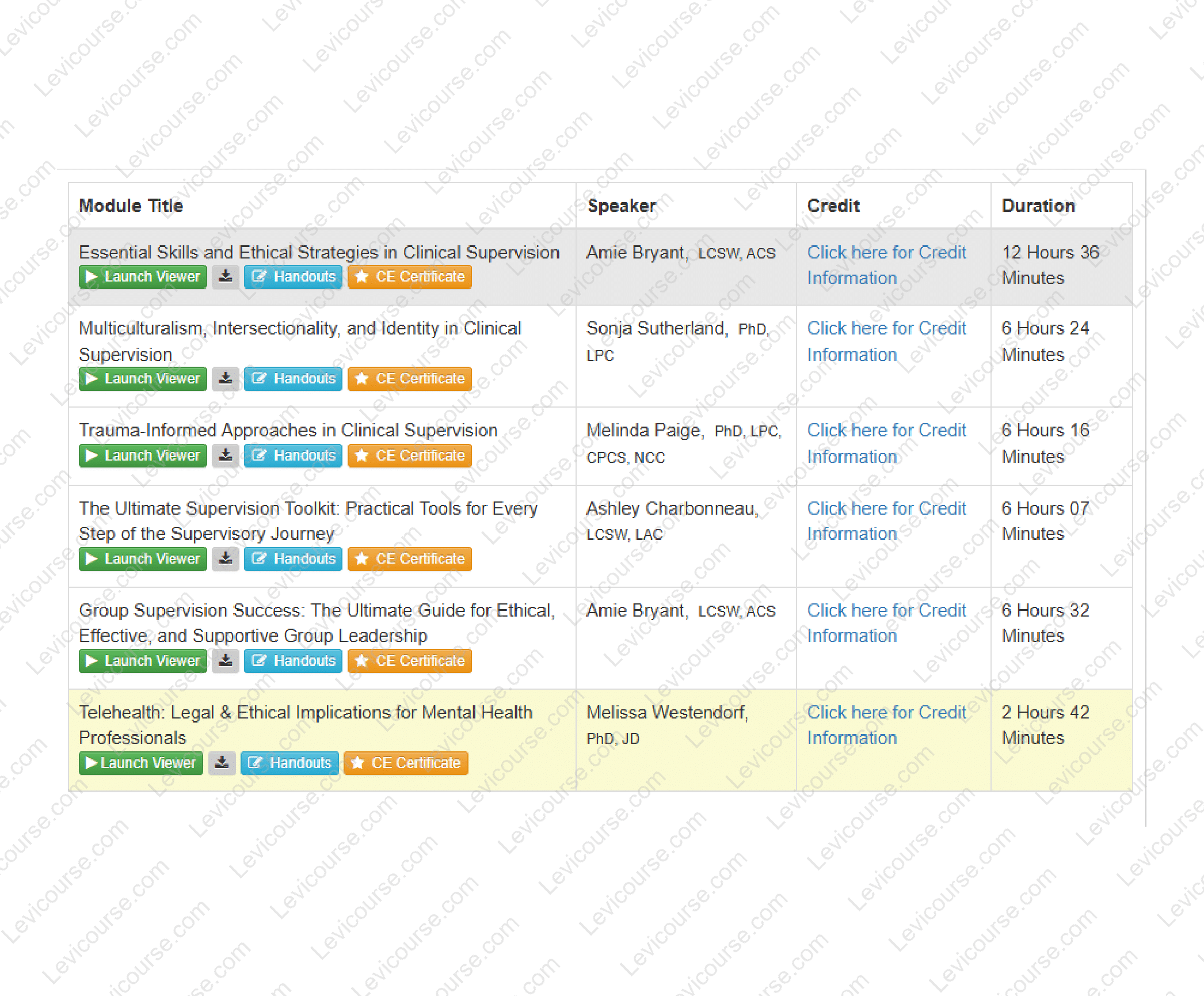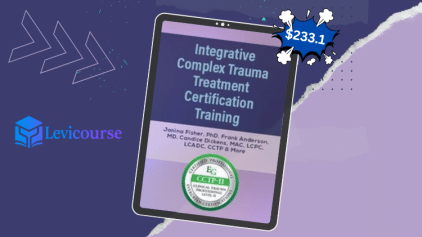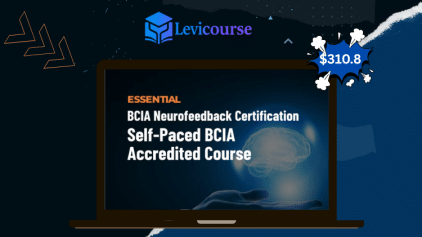Free Download 45-Hour Clinical Supervision Training – Mastering Trauma-Informed, Culturally Sensitive, Individual, and Group Supervision – Includes Verified Content:
45-Hour Clinical Supervision Training – Mastering Trauma-Informed, Culturally Sensitive, Individual, and Group Supervision – You Can Watch This Manual PDF Sample for Free to Know More Information:
45-Hour Clinical Supervision Training – Mastering Trauma-Informed, Culturally Sensitive, Individual, and Group Supervision – You Can Also View The PDF Sample below to Catch A Glimpse of The Content Inside:
45-Hour Clinical Supervision Training – Mastering Trauma-Informed, Culturally Sensitive, Individual, and Group Supervision – Your Complete 45-Hour Roadmap to Ethical, Effective, and Compassionate Clinical Supervision
The 45-Hour Clinical Supervision Training – Mastering Trauma-Informed, Culturally Sensitive, Individual, and Group Supervision is our most comprehensive learning experience for supervisors who want to lead with clarity, competence, and confidence. Built to align with the educational content areas required by many states and the Center for Credentialing & Education (CCE) for Approved Clinical Supervisor (ACS) credentialing, this training equips you to meet today’s supervision challenges: complex trauma presentations, multicultural dynamics, ethical gray areas, and escalating burnout.
Led by renowned faculty who’ve trained hundreds of clinical supervisors, this on-demand series blends practical frameworks with real-world case applications. You’ll leave with toolkits, templates, and protocols ready to implement in individual and group supervision—and the leadership presence to elevate your supervisees into skilled, ethical, and self-sufficient clinicians.
Why this 45-hour supervision course stands out
-
Credential-aligned & comprehensive: Designed to meet content areas widely required for ACS and state credentialing pathways.
-
Trauma-informed + culturally responsive: Integrates polyvagal, trauma-competent, and anti-oppressive approaches throughout.
-
Action-first training: Session structures, documentation kits, competency rubrics, remediation plans, and conflict-resolution scripts you can use tomorrow.
-
Individual & group mastery: Clear guidance to facilitate both formats ethically and effectively, including parallel process, group dynamics, and rupture/repair.
-
Ethics that work in the real world: Decision frameworks for boundaries, dual relationships, telehealth, HIPAA/HITECH, and interjurisdictional practice.
-
Supervisor wellness & leadership: Restorative practices, ANS regulation, and sustainable routines to prevent compassion fatigue and model resilience.
What you’ll gain
-
Cultural and trauma-informed supervision strategies for diverse supervisees and complex cases
-
Bold, compassionate feedback methods that grow skills while preserving alliance
-
Step-by-step guidance for individual and group supervision—from onboarding to termination
-
Complete documentation toolkit (contracts, agendas, case conceptualization, competency/evaluation forms, remediation templates)
-
Clinical review plans to streamline competency assessment and remediation
-
Supervisee self-care planning to buffer burnout and build long-term resilience
-
Ethical decision-making frameworks for sticky situations and gray areas
-
Conflict navigation protocols for difficult supervisees and high-stakes conversations
-
Supervision structures that maximize learning, autonomy, and professional identity
Course curriculum overview
Module 1 – Clinical Supervision: Essential Skills, Strategies & Ethical Insights
Lay a foundation of best practices, supervisory roles, and ethically sound processes from intake to termination.
You’ll learn to:
-
Build the supervisory alliance: trust/rapport, vulnerability, parallel process, role modeling
-
Navigate intersectional identity & positionality while upholding the Supervisee Bill of Rights
-
Structure the full journey: disclosure, interview/paperwork, goals, confidentiality, documentation, growth, and termination
-
Tailor your style using psychotherapy-based and supervision-specific models; integrate trauma-informed/anti-oppressive practice
-
Give better feedback: courageous conversations, constructive coaching, and micro-skills for growth
-
Handle challenges and repair ruptures; apply ethical decision frameworks for competence, consent, confidentiality, dual relationships, duty to warn, and risk mitigation
Module 2 – Cultural Competence in Clinical Supervision: Multiculturalism & Intersectionality
Develop the cultural humility and tools to address privilege, marginalization, and racial trauma—and translate that into ethical supervision and clinical care.
Key topics & tools:
-
Supervisor/supervisee differences, impact on alliance, and antiracist supervision practices
-
Microaggressions, race-based trauma, racial battle fatigue, and secondary traumatic stress
-
Racial socialization and sociopolitical context in case conceptualization
-
Cohesive application of multicultural models; intersectionality in client & supervisee presentations
-
Cross-Cultural Civility & Intelligence Mindset Development (4-stage model), racial/cultural identity development, transtheoretical change
-
Supervisor ethics: eliminating bias in assessment/treatment; clarifying positionality
-
Case studies & 2021 interviews with early-career clinicians—what supervisees need from culturally competent supervisors
Module 3 – Trauma-Informed Supervision: Ethical & Competency-Based Strategies
Become a trauma-competent supervisor who can evaluate risk, protect supervisee wellness, and maintain ethical standards.
You’ll learn to:
-
Apply the six principles of trauma-informed ethical decision-making
-
Build quality supervisory alliances through practitioner-centered approaches
-
Use trauma-sensitive models and techniques in supervision
-
Evaluate secondary traumatic stress, compassion satisfaction/fatigue; implement protective factors
-
Foster vicarious resiliency: meaning-making, posttraumatic growth, belongingness
-
Honor contextual/systemic factors, cultural adaptations, and client-as-expert stance
-
Implement restorative practices: mindfulness, autonomic regulation (ANS brakes, body awareness), therapeutic presence, and reflective practice
Module 4 – The Essential Supervision Toolkit: Structure, Documentation & Ethical Decision-Making
Run supervision like a well-organized clinic using plug-and-play resources.
Toolkit highlights:
I. Starting supervision – Contracts, agendas, documentation templates, confidentiality, licensure hours tracking, goal alignment
II. Developmental trajectory – Milestones, supervision roadmap, benchmarks
III. Fostering learning – Trauma-informed supervision checklist, collaborative goal tools, feedback loops
IV. Self-care & burnout prevention – Supervisee self-care plan, burnout risk checklist; modeling resilience
V. Expertise cultivation – Career trajectory worksheets, niche development plans
VI. Handling difficulty – Conflict resolution scripts, resistance management
VII. Remediation & evaluation – Performance tracking, formative vs. summative evaluation, competency assessments
VIII. Ethical termination & transition – Termination checklist, transition plan, post-supervision readiness
IX. Continuous improvement – Supervisor self-evaluation, supervisee feedback loops, resource library & updates
Module 5 – Group Supervision Success: Ethical, Effective & Supportive Leadership
Facilitate group supervision that is engaging, safe, and growth-oriented.
You’ll master:
-
Core definitions, benefits/limits, and types (psycho-educational, process, team, peer)
-
Supervisor qualities: emotional stability, empathy, cultural humility, trauma-informed leadership
-
Getting started: group size, logistics, agreements, informed consent, goal setting, evaluation forms
-
Resource packets: agendas, case conceptualization guides, ethics codes
-
Session structure via Tuckman’s stages (Forming→Adjourning) and a practical Arrive–Bridge–Agenda–Format–Wrap Up flow
-
Facilitation techniques: time management, check-ins, reweaving topics
-
Group dynamics: Yalom’s therapeutic factors, cohesion, feedback culture
-
Managing roles: monopolizers, quiet members, “experts,” dysregulated participants
-
Rupture/repair strategies, trust building, revisiting agreements
-
Advanced skills: parallel process, cultural humility in groups, co-facilitation
-
Growth tools: video review, conceptualization labs, psycho-education activities
-
Ethics: confidentiality, dual relationships, documentation standards
-
Evaluation & termination: performance measures, planned/unplanned closure, transition rituals
-
Best practices: model regulation, authenticity, reflective practice; supervisor self-reflection & bias awareness
Bonuses included
1) Boundaries & Dual Relationships in Clinical Practice
-
Navigate ethical gray zones, especially in rural/small communities
-
Risk-management strategies to protect both your license and your supervisees’
-
Taught by a former NASW Code of Ethics task force chair
2) Telehealth: Legal & Ethical Implications
-
Safely supervise and practice across state lines
-
HIPAA/HITECH compliance, interjurisdictional issues, risk/protection frameworks for remote work
Who this course is for
-
✔️ Licensed supervisors seeking ACS/state-aligned education and advanced practice tools
-
✔️ Clinicians transitioning to supervision who want ready-to-use structures and templates
-
✔️ Program directors & team leads building supervision systems across teams or agencies
-
✔️ Supervisors in trauma-heavy settings (community mental health, hospitals, schools, private practice)
-
✔️ Equity-focused leaders committed to antiracist, culturally responsive supervision
Key benefits you can implement immediately
-
Credential-ready content aligned with ACS/state requirements
-
Trauma-informed, culturally responsive supervision across individual & group formats
-
Documentation mastery with contracts, agendas, evaluation & remediation forms
-
Ethics confidence for telehealth, boundaries, confidentiality, and dual relationships
-
Competency-based evaluation with clear milestones and growth benchmarks
-
Burnout prevention via structured self-care and restorative practices
-
Conflict & remediation protocols that protect clients, supervisees, and your license
-
Scalable supervision structures for clinics, teams, and training programs
Final thoughts
The 45-Hour Clinical Supervision Training – Mastering Trauma-Informed, Culturally Sensitive, Individual, and Group Supervision gives you everything you need to lead with excellence—from ethics and cultural humility to trauma-competent practice and group dynamics. You’ll finish with confidence, clarity, and a complete toolkit to support supervisees through complex cases, rapidly changing norms, and the emotional toll of modern practice.
👉 Enroll now to elevate your supervision—and build the next generation of ethical, skilled, and resilient clinicians.











Reviews
There are no reviews yet.